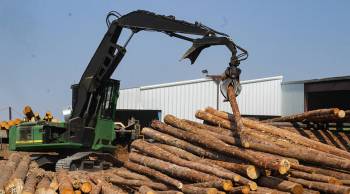
Small sawmill sees growth amid surging demand for lumber

Small, specialized sawmills are seeing growth during the pandemic. Consumers have been taking on DIY home-renovation projects and are willing to pay more for custom products in a marketplace of skyrocketing lumber prices.
Many large, automated sawmills stopped production of lumber during the pandemic amid expectations that housing demand would dry up for an extended period. But when that market came roaring back, the sudden demand for planks and other building materials caught lumber producers off-guard, contributing to the surging prices.
Lumber hit record highs during the pandemic, and it remains up more than 200% from a year ago.
Katrina Amaral, co-owner of Timberdoodle Farm in Strafford, New Hampshire, said she’s been seeing more customers coming in for Timberdoodle’s services. The company specializes in custom orders.
“A lot of people were buying lumber for desks, as you can imagine,” Amaral said. “We saw a spike in demand for flooring, definitely for raised bed lumber for gardening.”
Amaral spoke to “Marketplace” host Kai Ryssdal about how small sawmills are being affected by changing demand during the pandemic.
The following is an edited transcript of their conversation.
Katrina Amaral: In the sawmill world, we’re probably more like a small organic farm that does wholesale to restaurants in like [community supported agriculture]. It’s a bit more like a microbrewery compared to a big beer company.
Kai Ryssdal: I’m a big fan of microbreweries, so you’re on the right interview. What do you do then? I mean, do people bring boards to you, or bring logs to you, and ask you to cut them down? How does it work?
Amaral: There’s a wide variety of options, and we stay small so that we can stay flexible. Sometimes people do have trees cut down in their yards, and then they bring them to us for custom sawmilling. Sometimes we do logging, and sometimes we buy in logs for really specific custom orders.
Ryssdal: How has the pandemic changed, if it has, what you do at Timberdoodle?
Amaral: There was definitely an impact from the pandemic for a couple of different reasons. A lot of the bigger lumber yards started restricting in-person shopping, and so especially professional woodworkers, they came to us a little more than normal. A lot of people were buying lumber for desks, as you can imagine. We saw a spike in demand for flooring, definitely for raised bed lumber for gardening, and a lot more people looking to take down their own trees and then turn them into lumber.
Ryssdal: So when we see and when people hear on “Marketplace” all the reporting about lumber prices going through the roof, and that’s impacting home construction and all of that, are you seeing that? What does that look like from where you sit?
Amaral: It’s definitely very different for us. The really big spikes in lumber prices are, you know, publicly traded lumber. So we’re mostly seeing that effect from customers not questioning our prices as much. You know, our cost of production is a lot higher than a big automated mill. And so now that those prices have increased a lot, we don’t get really any pushback on what we’re charging for lumber.
Ryssdal: Right. So you have a little pricing power now, is what I’m hearing.
Amaral: A little bit.
Ryssdal: Fair. You said a minute ago that you’re staying small. Do I take that to mean you could ramp up if you wanted to because you got demand? You’re just choosing not to? And how come?

Amaral: It’s a couple of different things, I guess. One is that we would have to ramp up an extraordinary amount in order to compete on pricing with big mills. We produce about 100,000 board feet a year, and the really big mills are producing 300 million board feet a year. So that difference is really enormous. But also, it would be really challenging to increase our production without sacrificing our ability to handle the diversity of customers and custom jobs that we currently do.
Ryssdal: What is it going to look like for you post-pandemic? I mean, I don’t gather it’s changed a whole lot for you in the past 15 months. So I imagine the next 15 months aren’t going to be that different?
Amaral: No, we’re seeing a lot of change on the increase in homebuilding in our area. There’s been a really significant increase in development, and so that has brought with it a fair bit of awareness about where lumber is coming from. You know, you’re almost certainly within 10 feet of a timber product right now, and you’re also almost certainly have no way of knowing where that product came from, where that tree was growing. So that, I think, has really been the shift for our business.
There’s a lot happening in the world. Through it all, Marketplace is here for you.
You rely on Marketplace to break down the world’s events and tell you how it affects you in a fact-based, approachable way. We rely on your financial support to keep making that possible.
Your donation today powers the independent journalism that you rely on. For just $5/month, you can help sustain Marketplace so we can keep reporting on the things that matter to you.

















